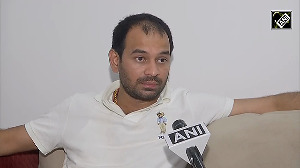Suspended by the Board of Control for Cricket in India for five years in December 2000, Jadeja has spent most of his time since trying to get the ban quashed.
But whatever the outcome of his legal battle, Jadeja will have a difficult time convincing India's cricket fans that he is clean.
 "Match-fixing was a black mark in our cricket history," said New Delhi fan Amit Saxena, who stopped watching cricket for almost two years in the aftermath of the allegations. "There is no doubt in the public's mind that these kinds of shady deals had become part of cricket in the late 1990s. Ajay Jadeja reminds us of those dark times. We wouldn't like to see him back on the field."
"Match-fixing was a black mark in our cricket history," said New Delhi fan Amit Saxena, who stopped watching cricket for almost two years in the aftermath of the allegations. "There is no doubt in the public's mind that these kinds of shady deals had become part of cricket in the late 1990s. Ajay Jadeja reminds us of those dark times. We wouldn't like to see him back on the field."
But the 32-year-old Jadeja, who possesses a bewitching smile and an infectious sense of humour, has his supporters.
Hundreds thronged the Karnail Singh Stadium, some to express their support and some out of plain curiosity, earlier this month when he played his first competitive club match in three years.
In the interim, Jadeja had remained active on the capital's party circuit and danced around trees in a Bollywood movie due to be released later this year.
He said this week he was finally back where he belonged, on the cricket pitch, but on the streets a debate rages about his place.
But unlike his ancestors, he was known also for street-smartness, which stemmed from a public school education in New Delhi.
A brilliant cover fielder who was always smiling on the field, Jadeja could lift the morale of his team and get under the skin of any opposition. In the two matches in which he captained India in 1999, when Mohammad Azharuddin was injured,
Jadeja, already one of the most recognisable faces in India, was then being hailed as a future one-day captain, but the Delhi police's allegations against then South Africa captain Hansie Cronje changed all that.
Cronje, who died in an air crash last year, admitted to having taken money from Indian bookmakers, who later formed the basis of the CBI report.
The BCCI conducted an independent inquiry into the CBI's report and then banned Azharuddin and former Test player Ajay Sharma for life and gave five-year suspensions to Manoj Prabhakar and Jadeja.
All four players denied any wrongdoing.
The BCCI has challenged that decision and a further hearing is set for July 21.
The recent developments have brought Jadeja, who had shot into the limelight by battering Pakistani fast bowler Waqar Younis for 45 runs off 25 balls to set up a memorable win during the 1996 World Cup, to the forefront of media attention once again.
He still has a long way to go before he can be eligible to play cricket for India again, but the topic has become a popular conversation point.
With 5,359 runs in 196 one-day matches at 37.37, his record for a number six batsman is undeniably impressive even though he got many of the runs in losing causes.
Of the 36 matches in which he scored more than 50 runs, India won 21 and lost 15.
Jadeja's international cricket future, even if he wins the court battle, could also depend on his former team mates.
He may not be welcomed back into the side, which had to live down the match-fixing controversy in front of shocked fans for quite a while.
The interim court decision was a big step for Jadeja, but redemption may still be a long time coming.








